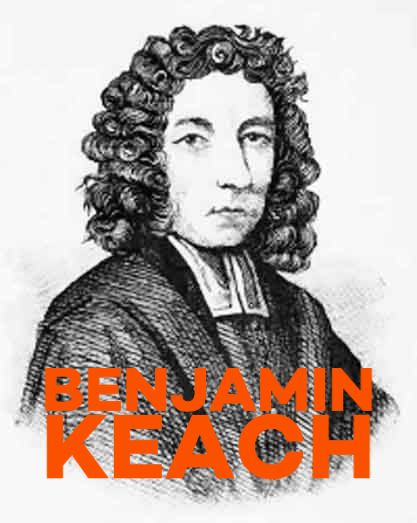Benjamin Keach was born in 1640 in Stokes-Hammond, Bucks, England, and died July 18, 1704, in Horselydown, Southwark, England. Keach was a famous Baptist preacher in London who, among other achievements, wrote two theologically influential Baptist works, developed the first Baptist Catechism in 1677, and was involved in the formation of the Second London Baptist Confession of 1689 in tandem with the historically significant Baptist ministers Hanserd Knollys and William Kiffin, among others.
Keach was born into an Anglican family and was christened as an infant, but at the age of fifteen was convinced by Scripture that his paedobaptism was invalid and that he subsequently needed to be re-baptized by immersion upon a profession of faith. By the mere age of eighteen, he began to preach, and in 1660, at the age of only twenty, Keach began preaching regularly in Southwark, where he remained to shepherd his flock for the rest of his life. His congregation was later named the New Park Street Church and then moved to the Metropolitan Tabernacle, coming under the pastorship of famous Baptist preachers such as John Gill, John Rippon, and later, Charles Spurgeon.
On October 8, 1664, Keach was imprisoned for two weeks and fined twenty pounds for preaching without a license from the Church of England, and for his Baptist Catechism — a considerable amount in those days (about $4000 today) for a poor Puritan preacher who did not align with Anglicanism. It was said that he was arrested on the charges of being “a seditious, heretical and schismatical person, evilly and maliciously disposed and disaffected to his Majesty’s government and the government of the Church of England.” Keach’s imprisonment put him in prison around the same time as his fellow Baptist John Bunyan, the author of Pilgrim’s Progress.
The Church of England tried to silence Keach by further punishing him by placing him in the pillory. Keach, the bold man that he was, saw this as an opportunity to defend his writings and preach in front of a crowd. It is recorded that Keach asked if the authorities and Anglican ministers present could prove his works and preaching as false, to which they could not respond, to the effect that they only became all the more frustrated with him. So, as Keach would not cease defending his Baptist convictions, the authorities burned his Catechism right in front of him and threatened to gag him. But, before he was silenced, it is recorded that he quoted Matthew 5:10, saying, “Blessed are those who are persecuted for righteousness’ sake, for theirs is the kingdom of heaven.”
In 1668, while traveling to Southwark, he and his family were tragically robbed of all their possessions. That same year, he was so ill and was left by doctors to die. However, friend and fellow preacher, Hansard Knollys (1599–1691), heard and came to his bedside, and prayed for his recovery. After praying, he told Keach that he would be in heaven before him. To the surprise of all, Keach quickly recovered, and Knollys died two years later. In 1670, his first wife, Jane Grove, died after ten years of marriage and having five children, of whom only three survived infancy. He married a second time to Susannah Partridge (d. 1732).
Throughout his lifetime Keach often wrote to defend Christian convictions against the Quakers (his oldest daughter was a Quaker which created a lot of desire in his writings), but his most lasting influence likely comes from his role in the “hymn-singing” controversies. Keach is generally credited with being the first to introduce congregational hymn singing as a part of the regular worship of English-speaking congregations. Which he even used as a tactic to prevent being arrested by blending in with the congregants, so that the authorities did not know who started the singing.
Benjamin Keach died at the age of 64, on July 18, 1704, having pastored the same church for 36 years. His body was laid to rest in the Baptist cemetery. Through his many trials, he still managed to compile forty-three books.
A funny side story is Benjamin Keach’s son, Elias Keach, (born in 1666 in London) came to America in 1686, dressed in black and wearing a clerical collar, hoping to be accepted as a minister. His ploy worked, and many people gathered to hear him preach. One Sunday, he was preaching his sermon and was convicted by his own message. He froze and when the congregation asked him what was wrong, he confessed his sins in front of the congregation and asked for a Baptist minister, and immediately went to him. He was saved and baptized at Pennypack Creek along the Delaware River. He was then ordained to the ministry and continued to minister faithfully.

